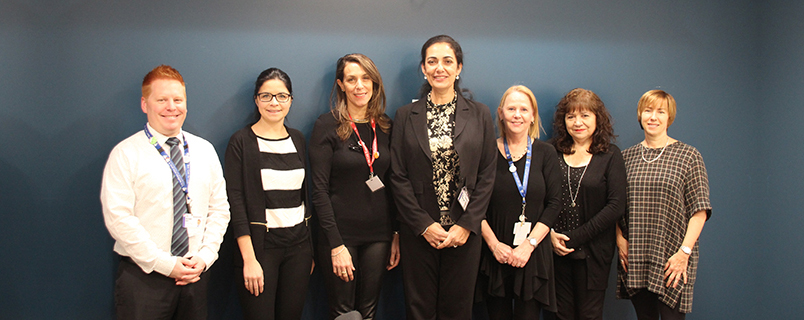Behind the Scenes of the Lachine Hospital Modernization Project

"Everything starts with listening," explain Malika Cheloufi and Samia Mostefai, the two planners of the Lachine Hospital modernization project at the McGill University Health Centre. “As architects, we must understand the needs of the users in order to adequately account for them in a plan, and then transform them into reality.”
At the moment, Malika and Samia are at the beginning of this process. Over the past few months, the Lachine Hospital community has met for three Lean workshops to develop the vision of the project and design an environment of caretaking and work centered first and foremost around patients, but also built with the concerns of the staff in mind. (See sidebar: “Lachine moves quickly with Lean design”.) Samia and Malika 's Functional Plan (FP) for the Lachine Hospital will be developed in conjunction with the Clinical Plan approved by the Ministère de la Santé et des Services sociaux, the results of the Lean workshops and the information gathered by the team during their meetings with the users. Their greatest challenge? Interpreting a vision while respecting a budget and the arranged deadlines.
"We are constantly juggling three elements: cost, timelines and quality," the planners explain. “The functional plan integrates activities, furniture, equipment, employees, types of patients, etc. We must help to improve the daily lives of users, who need to adapt to their environment on a daily basis and who do not always realize how many ineffective or repetitive actions are caused by poor planning. On top of everything, we must also apply the National Building Code standards. There are thousands of decisions to be made and we must respect each step before building the walls."
Flexibility to evolve
Another important feature of a successful development project is its flexibility.
"Our functional plan must be consistent with current best practices," notes Teresa di Bartolo, MUHC Planning Services manager. “However, we are faced with the fact that health care is changing rapidly and technology is changing just as quickly. We do not want to plan something that will be immediately obsolete."
Whether it's the emergency or operating rooms, ambulatory services or hospitalization units, nothing is conceived by itself — Teresa di Bartolo
Teresa sees a project of this magnitude as a huge puzzle, where each piece has to fit together to create a unique vision. "Whether it's the emergency or operating rooms, ambulatory services or hospitalization units, nothing is conceived by itself," she says.
The MUHC planning team will not be responsible for the renovations. As soon as the FP is complete, the Société québécoise des infrastructures (SQI) will take over, but Malika and Samia will continue to participate in the project. As liaison between the builder and the people within the hospital, they will ensure compliance with the plan to modernize and fulfill the dreams of the Lachine Hospital community.
Lachine kicks into high gear with Lean design
The third workshop on the modernization of the Lachine Hospital brought some major news: the participation of the GSS engineering consulting firm in the exercise. This company, an expert in the Lean Design approach, have already contributed to the modernization project at the CHU de Québec.
"The Lachine modernization project is a golden opportunity to rethink care and service delivery while modernizing facilities and spaces that are more than 100 years old," said Noé Djawn White, interim associate director, Integrated Information Management, Performance and Continuous Improvement.
The Lean approach is based on the continuous improvement and development of employees and managers. Our collaboration with GSS will help us leverage their expertise to innovate through Lean Design and optimize the ideas submitted in the FP for the facility. Until then, it means improving clinical, administrative and support processes."
For Project Manager Michèle Czerednikow, raising employee and stakeholder awareness of the benefits of the Lean method will significantly improve the success of the project. "Each Lean workshop targets one of the functional program deliverables," explains Michèle. “By remaining focused on this goal, a consensus can be reached. The ultimate goal is to have a health centre set up within the local community while benefiting from close ties with the MUHC and creating their own contributions to care, instruction and research."
